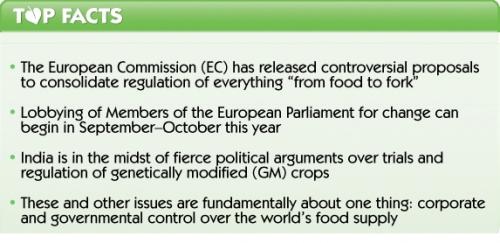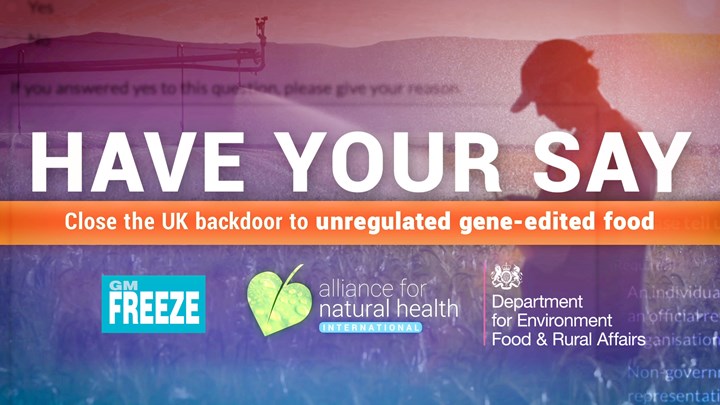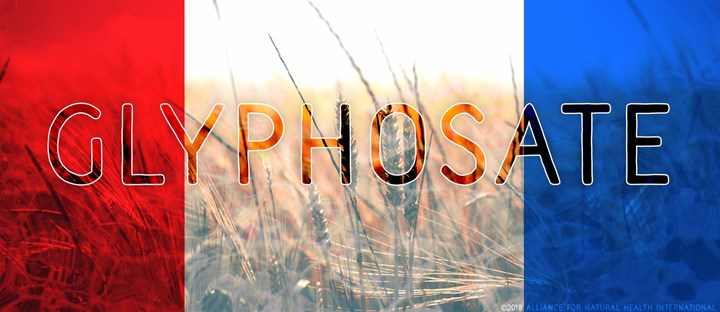Content Sections
In Europe, a new battle looms over the availability and free exchange of seeds, joining the worldwide struggle against genetically modified (GM) organisms. What’s it all about? To paraphrase a famous saying, “It’s control of the food supply, stupid”.
Is there anything the EU won’t regulate?
We spend a lot of time looking at European Union (EU) legislation here at ANH-Intl, so we’re well aware of just how numerous – and pervasive – the EU’s tentacles are. But even we were surprised at the scope of new legislation announced earlier this week. Put simply, what the European Commission (EC) is currently calling the ‘Animal & Plant Health Package’ (APHP) will regulate everything “from farm to fork”. In the EC’s own words: “This body of legislation is a complex, integrated system of rules which takes care of all the links in the food chain from: the protection of plants from pests, the protection of animals and humans from animal diseases (and from such diseases which are transmissible to humans) and the protection of human health from all the hazards that might arise along the agri-food chain. It also includes all those rules which allow the Single Market to function smoothly in this area and provides rules for the protection of consumers.”

Many of you will by now know that legislation that claims to protect the public is often more about governments developing a system of rules that effectively give a handful of companies something close to a monopoly.
To make it more palatable, we are told that this new package will replace and simplify an existing raft of nearly 70 pieces of legislation to a mere five. So in fact, the EC has had its fingers in all of these pies – excuse the pun – for a long time now, but it takes big revisions of legislation like this one to really bring home the extent to which its bureaucracy infects the lives of every EU citizen.
But simplification is good – right?
As a rule, yes: simpler legislation is generally better, as long as it avoids ambiguity and the rules aren’t written by a certain clique for the benefit of another clique. Which kind of rules out the EU at a stroke, but we’ll continue nevertheless. Whether the act of condensing 70 pieces of EU legislation into five will genuinely simplify the legislation is, of course, a moot point; as is whether it will bring any improvements for European citizens as compared with the current situation. Our brief review of the legislation, along with commentary from others who have indulged themselves in its small print, has thrown up some major concerns.
Ominous wording
For a start, the list of Frequently Asked Questions on the EC website immediately invokes a gambit that makes our flesh creep: “The EU "from farm-to-fork" policy covers legislation to protect health [original emphasis]...” We’ve seen this over and over again in natural healthcare-related legislation. The ‘protecting public health’ mantra is usually invoked when the EC is up to something dodgy with few benefits for public health, when a convenient and difficult-to-argue shield is required to deflect criticism. Think of the Traditional Herbal Medicinal Products Directive (THMPD), for example, or the Nutrition and Health Claims Regulation (NHCR), among others.
Heirloom seeds – a thing of the past?
The Real Seed Catalogue website and the Campaign for Seed Sovereignty both rightly highlight the potential for the new laws to restrict access to heirloom seeds through the establishment of a pre-market authorisation system (sound familiar?) for seeds. Predictably, Commissioner Tonio Borg dismissed these and similar fears in a letter to the Seed Savers Association in Central Europe.
Enter the European Parliament
Although this sounds ominous, and definitely the kind of thing the EC would do, we must point out a couple of salient facts. Firstly, that several important additions were made to the latest version of the legislation, which should allow home gardeners, small businesses and seed banks to use unapproved seed. Secondly, the APHP is still at a relatively early stage: now that the EC has released its proposals, the European Parliament will become involved in the discussion and amendment stage. It will not be until September–October 2013 that a Parliamentary Committee will be assigned to the proposal. Interestingly, it will most likely be the Environment, Public Health and Food Safety (ENVI) Committee – which opposed the introduction of the APHP in the first place.
Perhaps the most important thing for those with a horse in this race to realise is that the true lobbying must begin later this year: when the Committee has been announced and when EU citizens know which Members of the European Parliament to contact with their concerns.
Meanwhile, over in India...
Last year, India’s Technical Expert Committee (TEC) recommended a 10-year moratorium on field trials of GM Bt food crops, a call that was recently endorsed by 51 leading, independent, international scientists. The proposal has unsurprisingly met with opposition from pro-GM quarters, and it appears that the pro-GM faction within the Indian government has come up with a way around the proposed ban. If passed, the Biotechnology Regulatory Authority of India (BRAI) Bill, introduced on Earth Day, 22nd April, will create a single body responsible for approving GM crops in India – and will be overseen by the Ministry promoting biotechnology. Such massive conflicts of interest are only par for the course with GM technology, it seems. Pressure is mounting for the Indian government to withdraw the bill.
Control of the food supply
Strip away all the scientific and emotional baggage accompanying issues like the EU’s APHP, with its potential to control the availability and free exchange of seeds, and GM and we’re left with the simple matter of control – control of the world’s food supply by governments and international corporations. To that list, we might add the rise of seed banks such as the Svalbard vault on the Norwegian island of Spitsbergen. If the worst-case scenarios of the EC’s proposed legislation play out, we can imagine a future where the vast majority of seed crops grown throughout the world are genetically modified, patented and owned by companies like Monsanto; where the only seeds grown by anyone, even individual gardeners like you and I, are government-approved; where government-approved GM animals roam free; and where the only heirloom seeds on the planet are locked away from the hoi polloi in secure, underground vaults.
Resisting dystopia
This isn’t scaremongering; this is the world the corporations and their government lackeys appear to have in store for us. More than ever, now is the time to get informed and get involved in the struggle to maintain the stewardship of agriculture and the natural world in hands of humankind, and out of the pockets of the greedy control freaks who think they run the world.
We’ll keep you posted as we unfold our lobbying campaign on the European Parliament on this crucial issue – and we will be calling for your help to ensure your democratic voice is heard.








Comments
your voice counts
17 May 2013 at 9:55 am
We don't want our food and seeds controlling, we as responsible adults feel like we are more than capable of choosing for ourselves what we eat and what we plant. Many many people and small farms will suffer terribly as a result of the new proposed rules. We implore you not to do this as it would be a terrible mistake that will affect a lot of people in a very negative way
Your voice counts
We welcome your comments and are very interested in your point of view, but we ask that you keep them relevant to the article, that they be civil and without commercial links. All comments are moderated prior to being published. We reserve the right to edit or not publish comments that we consider abusive or offensive.
There is extra content here from a third party provider. You will be unable to see this content unless you agree to allow Content Cookies. Cookie Preferences